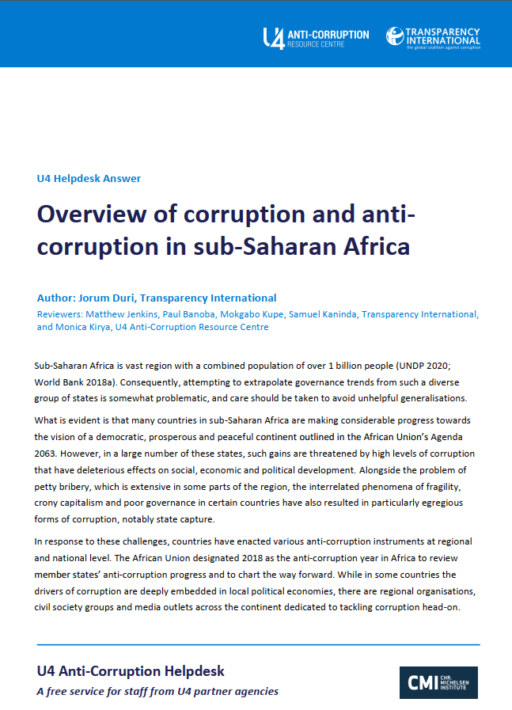
This Anti-Corruption Helpdesk brief was produced in response to a query from a U4 Partner Agency. The U4 Helpdesk is operated by Transparency International in collaboration with the U4 Anti-Corruption Resource Centre based at the Chr. Michelsen Institute.
Query
Please provide an overview of the nature of corruption in sub-Saharan Africa, with a particular focus on state capture and fragility, as well as the anti-corruption activities of relevant regional organisations
Summary
Sub-Saharan Africa is vast region with a combined population of over 1 billion people. Consequently, attempting to extrapolate governance trends from such a diverse group of states is somewhat problematic, and care should be taken to avoid unhelpful generalisations.
What is evident is that many countries in sub-Saharan Africa are making considerable progress towards the vision of a democratic, prosperous and peaceful continent outlined in the African Union’s Agenda 2063. However, in a large number of these states, such gains are threatened by high levels of corruption that have deleterious effects on social, economic and political development. Alongside the problem of petty bribery, which is extensive in some parts of the region, the interrelated phenomena of fragility, crony capitalism and poor governance in certain countries have also resulted in particularly egregious forms of corruption, notably state capture.
In response to these challenges, countries have enacted various anti-corruption instruments at regional and national level. The African Union designated 2018 as the anti-corruption year in Africa to review member states’ anti-corruption progress and to chart the way forward. While in some countries the drivers of corruption are deeply embedded in local political economies, there are regional organisations, civil society groups and media outlets across the continent dedicated to tackling corruption head-on.
Contents
1. Overview of corruption in sub-Saharan Africa
2. Nature of corruption challenges
3. Overview of anti-corruption frameworks in sub-Saharan Africa
4. Regional organisations and initiatives
5. References
Main Points
- Global governance indices suggest that the public sector in sub-Saharan Africa is the most corrupt of any region in the world. Many citizens believe that levels of corruption have increased in recent years and are not satisfied with their governments’ anti-corruption efforts.
- Corrupt practices are deeply intertwined with ongoing conflict and state fragility in some African countries, notably in the Horn of Africa, the Sahel region and the Democratic Republic of the Congo.
- Political corruption is common, and it takes many forms, such as state capture, patronage networks, opaque political party financing, vote buying and unresolved conflicts of interests.
- Land-based corruption is especially prevalent in the region, and studies have shown that women are particularly vulnerable.
- Various regional legal instruments have been introduced in the last two decades, with mixed results, while there is a growing number of regional organisations, civil society and media groups involved in anti-corruption work.
Authors
Jorum Duri, [email protected]
Reviewers
Matthew Jenkins, Paul Banoba, Mokgabo Kupe, Samuel Kaninda, Transparency International, and Monica Kirya, U4 Anti-Corruption Resource Centre
Date
28/04/2020

